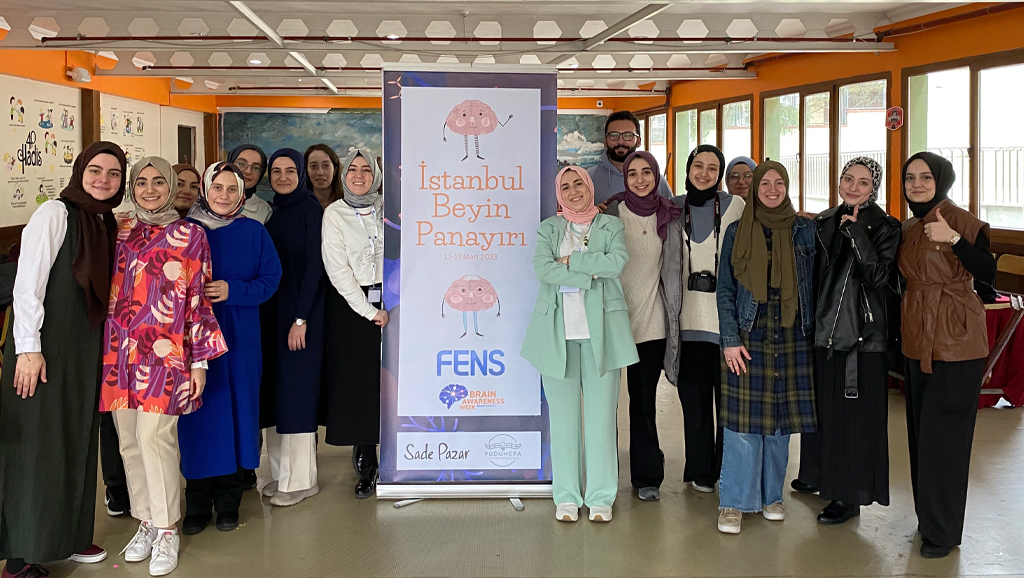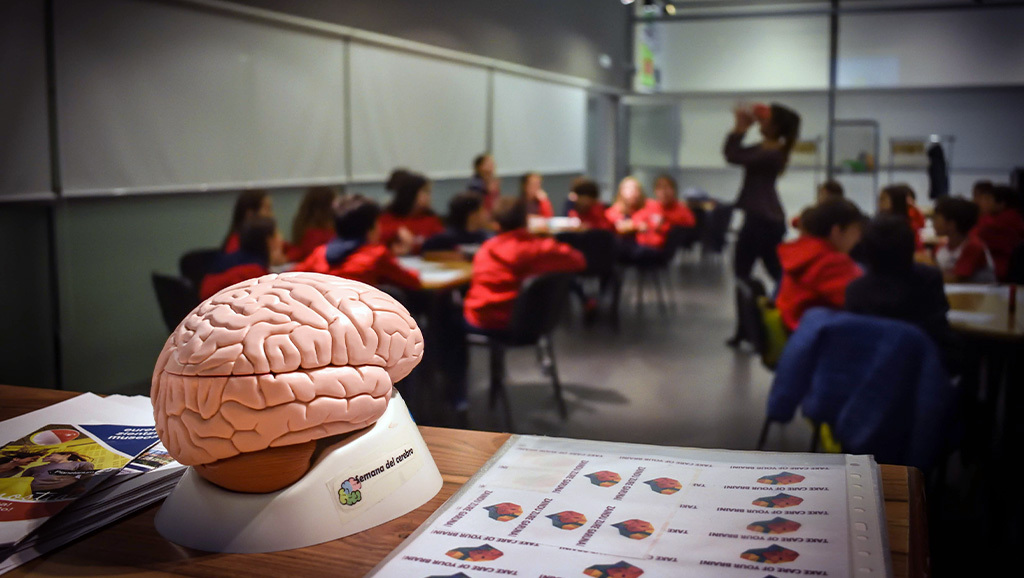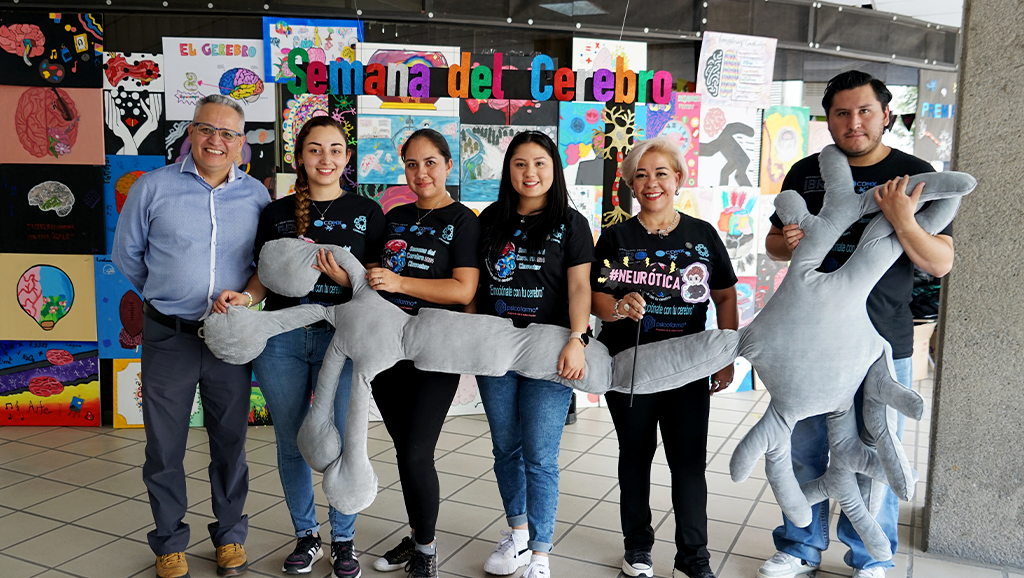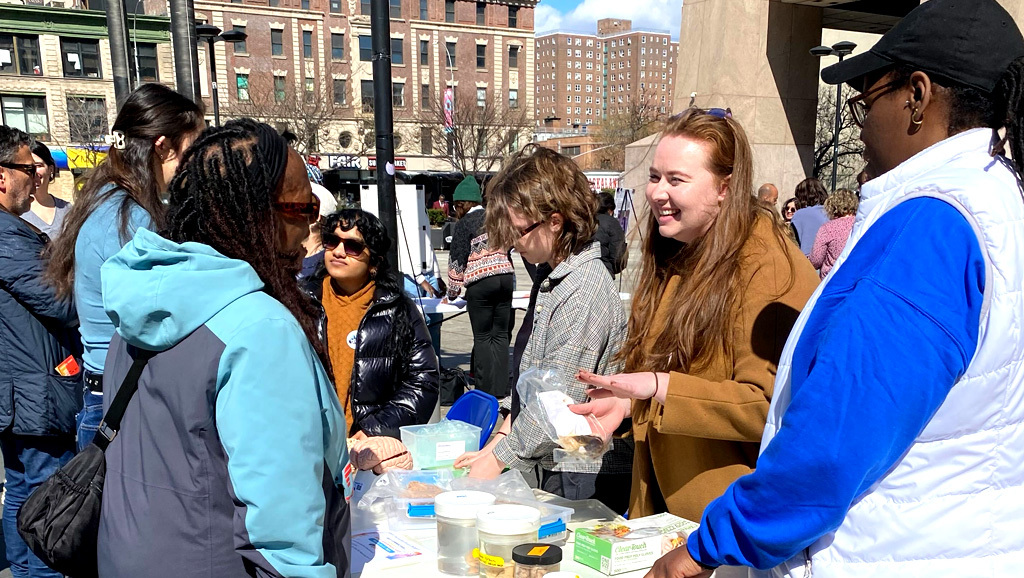For nearly three decades, Brain Awareness Week has fostered public enthusiasm and support for brain science around the world through a range of local outreach programs, targeting people of every age and background. Each event held furthers the campaign’s mission: to share the wonders of the brain and the impact brain science has on our everyday lives.
Because Brain Awareness Week organizers are part of the communities they target in their outreach, they know what topics local people might want or need, and what types of activities will draw them in. Organizers host brain fairs; musical performances; classroom programs; art contests; lab tours; library visits; lively debates; quiet spaces to share feelings about a disease or diagnosis; even podcasts and television appearances.
During the 2023 campaign, hundreds of events were held in more than 50 countries across six continents. We hope to increase that number further during this year’s campaign, March 11-17.
Expanding Global Outreach
To extend the campaign’s reach and touch the lives of more people, the Dana Foundation funds large annual grants to two neuroscience associations that then offer smaller grants to individual groups. One of Dana’s two grantees is the Federation of European Neuroscience Societies (FENS), which represents 44 national and single-discipline neuroscience societies across 33 European countries, including more than 22,000 member scientists. Through its Brain Awareness Week grants program, FENS offers general support for outreach activities with an emphasis on funding projects that include diverse audiences and in countries that are new to the campaign.
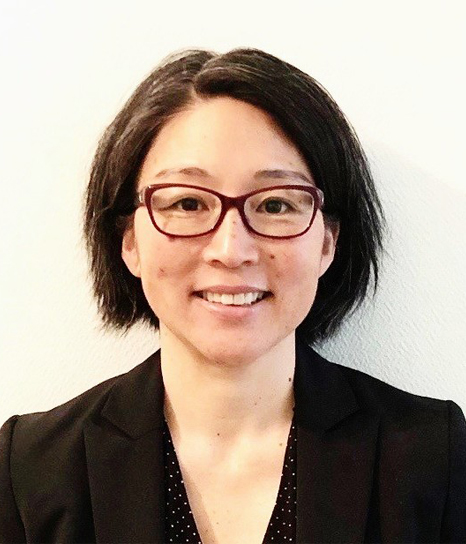

Tasia Asakawa, executive director of FENS
An impressive number of groups apply for these grants. For the 2023 campaign, FENS received 114 applications from Brain Awareness Week organizers in 29 countries, a 36 percent increase from the 2022 campaign. It funded 38 programs in 22 countries.
“The grants help the awardees, of course, but they also help FENS,” said Tasia Asakawa, the organization’s executive director. “We know that we cannot organize and do these activities on the ground in so many different countries under so many different conditions and within so many different contexts. Through these grants, we can reach more people, supporting increasing awareness of the brain and nervous system research, and inspiring people to cultivate a lifelong interest in neuroscience.”
FENS has successfully administered this grants program for 17 years, since 2006, and its model of Brain Awareness Week-grant management has been adapted for use by other organizations such as the Wellcome Trust and the International Brain Research Organization. One part of the model is helping potential grantees through a process that may be new to them, as well as giving them an idea of what type of projects have a better chance of being funded.
“We have a FENS Friday webinar series, bringing in previous grantees and award-winners to give talks and answer questions,” Asakawa said.
FENS requires grantees to report data such as the number of people reached and audience composition, geographical diversity, and level of accessibility, as well as descriptions of the programs themselves. Responding to this data, FENS then reshapes the way future Brain Awareness Week grants programs are designed, promoted, and implemented.
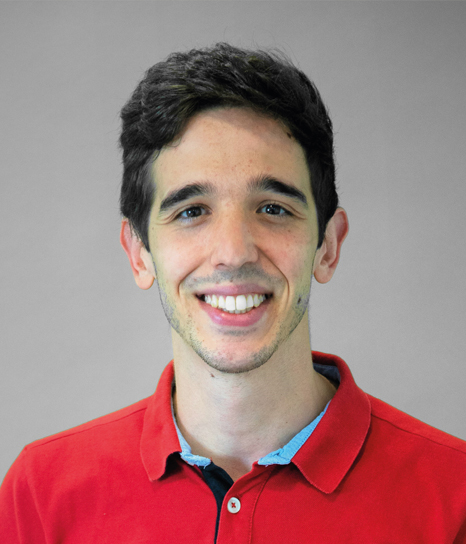

Rui Rodrigues, Ph.D.
Long-term Benefits
For Rui Rodrigues, Ph.D., and his colleagues at the University of Lisbon, the FENS/Dana Brain Awareness Week grant in 2022 “gave a lot of visibility to ‘Fala-me Neuro’ [Tell me about Neuro], our all-Portuguese neuroscience communication project.” The funds helped them increase the number of students they could reach in a short time. “Our main goal was to break down complex neuroscience-related topics to young people, and we were able to reach around 500 students [of various ages] in just one week, which was really remarkable,” he said.
The benefit is not just in direct interaction with local people. In addition to sharing science, the events “had a substantial impact on my career,” Rodrigues told FENS in a 2022 interview, “by putting me in contact with people from different fields—networking with other awardees and communication offices—and allowing me to further develop my management and communication skills, which are essential tools if you aim to become a great scientist.” Rodrigues is currently a postdoctoral fellow at Neurocentre Magendie in Bordeaux, France.
For FENS itself and its member organizations, participating in outreach campaigns such as Brain Awareness Week offers increased public visibility as an organization and for their individual members, who gain notice in their communities and, often, in the media. In several cases, participating in joint Brain Awareness Week events has inspired collaborations and/or partnerships between researchers in different fields and with non-scientist groups.
Reaching Audiences Where They Are
In Romania, Brain Awareness Week has been going strong. The 2023 campaign last March was the fifth consecutive year that Ioana R. Podina, Ph.D., at the University of Bucharest, organized a “My Curious Brain” program for people in the community. Using a FENS/Dana Brain Awareness Week grant, she and her colleagues could expand on the year’s topic: “The Brain and Mental Health.”
“I started organizing my first Brain Awareness event during my first year at the University of Bucharest. The response was so positive among my students that it got me hooked,” Podina told FENS. “In the following years, I started seeing more and more people from the general community taking time to come to our events, and that gave me the ultimate joy, as my purpose is to disseminate scientific knowledge.”
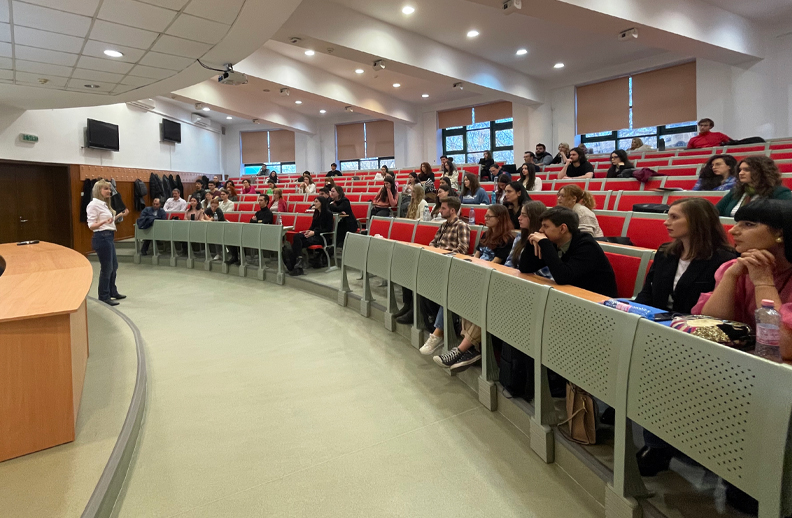

Ioana R. Podina, Ph.D., during a Brain Awareness Week event at the University of Bucharest. Photo courtesy of FENS.
The interdisciplinary event series brought together experts from neuroscience, psychology, biology, and enzymology to discuss mental health from various perspectives. Some of the 17 lectures and workshops took place online and others in person, reaching different audiences. Discussion topics included the shared phenotypes of autism and schizophrenia, brain-boosting proteins and their role in Alzheimer’s prevention, reforming mental health diagnoses from the perspective of neuroscience, and new digital mental health interventions.
“One of the best things about organizing Brain Awareness Week is the chance to make a positive impact in our own communities,” she said. “By hosting events and activities that promote science education, we can inspire others to grow an interest in these topics and learn more about the amazing world of neuroscience.”
Sharing a Love of Science
In Turkey, Havva Demir, Ph.D., DDS, used a FENS/Dana Brain Awareness Week grant to put on “The Brain Fair Istanbul,” bringing to others the kind of event that changed her life when she was a child.
“I have always been interested in science, but I felt I was a misfit, a nerd,” she told FENS. “Then one day there was a science fair at my school. Everyone was joyful and interested, including the bullies. That day, all of the students could see science from my perspective, as a fun discipline to be interested in. Their reaction made me feel I belonged to the group. I want to re-create that atmosphere with neuroscience.”
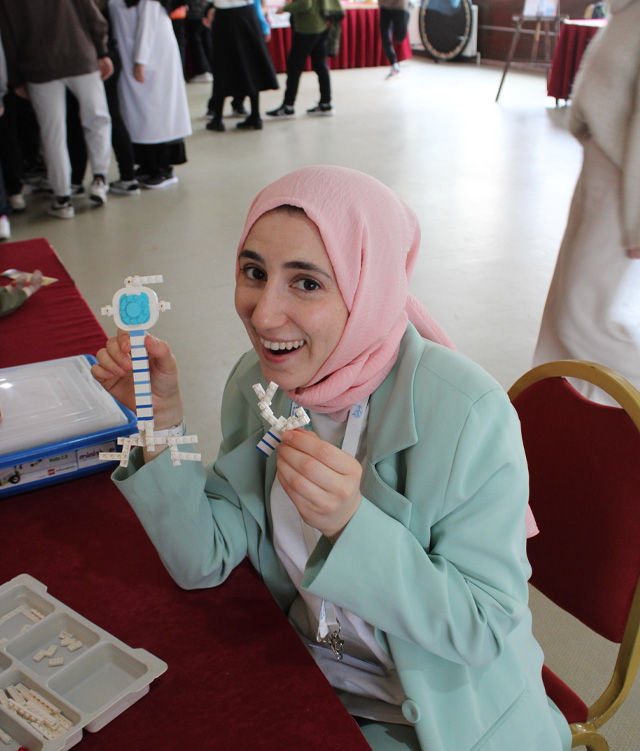

Havva Demir, Ph.D., at “The Brain Fair Istanbul.” Photo courtesy of FENS.
The Brain Fair Istanbul took place in five middle schools for an audience of middle school students and included high school students as poster presenters. “On top of that, my organization team consists mainly of university students and fresh graduates,” Demir said. “So, all in all, we cover a large audience, from 10 to 25 years old.”
The main goal of Demir’s event was to bridge the gap between introverted and extroverted children by using a game of collecting “brain points.” Fairs are generally more suited to outgoing people, she said. “They quickly visit each stand, have fun, and call it a day. However, introverted people are slower, but more curious; they learn more, but have less fun in public. This practice encourages both to listen to poster presentations and learn new concepts, while gaining brain points. Listening will be easier for curious, introverted students, giving them a better chance at enjoying the fair slowly, while extroverted students are encouraged to spend more time learning.”
In addition to lots of fun, healthy snacks, trampoline jumps, Lego puzzles and other games, the organizers aimed “to provide answers to their curious minds, while opening up a new curiosity channel, called ‘neuroscience,’ in their minds,” Demir said.
A Vision for Future Outreach
Through its 17 years (so far) of distributing FENS/Dana Foundation Brain Awareness Week grants, the organization has received around 1,400 applications from 34 countries and given out 572 grants, totaling 550,000 Euro.
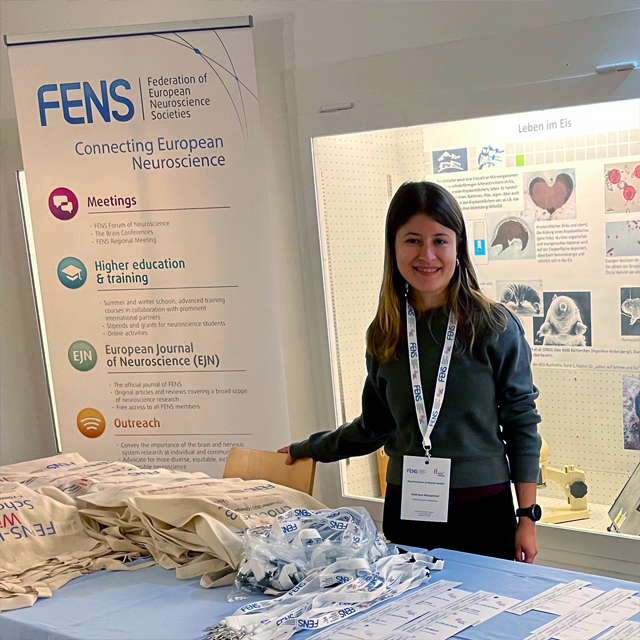

Andreea Marginean, program officer at FENS
“Organizing Brain Awareness Week is such an amazing opportunity to connect with like-minded individuals who are passionate about spreading awareness about neuroscience and science education,” said Romania’s Podina. “When we come together with other countries worldwide, we feel like we’re part of a bigger dissemination project that can make a real difference in the world. Plus, the event’s global reach allows us to share information and resources with people from all walks of life.”
There will always be a need for outreach like Brain Awareness Week, said FENS’s Asakawa. “We’re going to have new generations of scientists coming up, and they will still need to increase awareness,” she said. “Awareness outreach kind of peters off for a while, as people go into their professional worlds. They might implement BAW activities in the future in their own professional capacities. But then there’s the next generation; and they have to be informed, and they have to be involved. They have to know how to perform outreach activities and inspire other people.”
“We learn something new about the brain every year—every month!” Asakawa said. “We don’t know everything about the brain yet, and so there will always be a need to increase awareness and outreach.”
